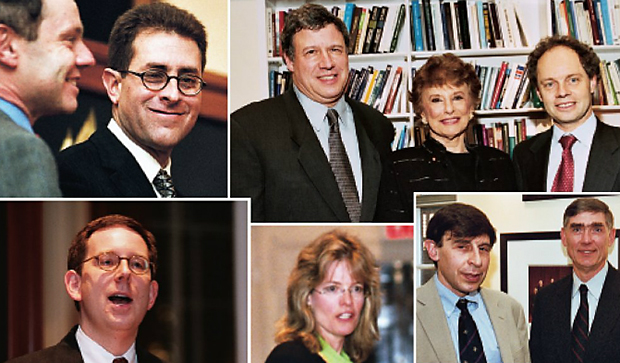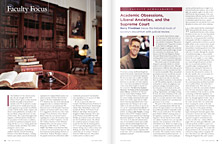Six Inaugural Lectures Celebrate New Professorships, Javits Program
Printer Friendly VersionThe Jacob D. Fuchsberg Professorship of Law was endowed by the Fuchsberg family to honor Judge Fuchsberg (’35), a preeminent trial lawyer, supporter of legal education, and protector of civil liberties on the New York Court of Appeals. The inaugural lecture, delivered by Professor Barry Friedman, the Jacob D. Fuchsberg Professor of Law, was entitled “The Importance of Being Positive: The Nature and Function of Judicial Review.” Friedman argued that “judicial review serves primarily to foster a societal dialogue on the meaning of the Constitution and constitutional rights.”
Dean Richard Revesz expressed his gratitude to the Fuchsberg family—four generations of which are Law School alumni, including Law School Trustee Alan Fuchsberg (’79)—for their generosity. “A chaired professorship is one of the most meaningful gifts that a donor can make,” the dean said, noting that such professorships play an important role in building the NYU School of Law’s extraordinary faculty.
Speakers at the inaugural lecture of the Jacob K. Javits Distinguished Scholar In- Residence Program paid tribute to the New York Senator’s 24-year career as a champion of social security, civil rights, health-care reform, education, and the arts.
Javits’s appeal was recalled by his wife, Marian, and his son Joshua, who help direct the Jacob K. Javits Foundation. They told the story of an encyclopedia salesman who never received a bachelor’s degree but saved enough money to attend the NYU School of Law as a night student, graduating in 1926. While earning his two-year degree, Javits worked during the day collecting debts for businesses, attended classes in the evening, called his debtors again after class, and then finally began studying at 10 p.m. His son noted how much Javits valued his education at the Law School, where he learned the powerful skills of lucid explanation and structured thinking from his professors.
To honor the Javits legacy, Professor Geoffrey Stone chose to discuss the McCarthy era’s threat to free speech and its parallels to present-day concerns about civil liberties in a lecture titled “The End of Free Speech: A Cautionary Tale.” Stone is visiting from the University of Chicago Law School, where he is the Harry Kalven Jr. Distinguished Service Professor of Law and a former dean and provost.
In his remarks to inaugurate the George T. Lowy Professorship of Corporate Law, Dean Revesz posited that the modern history of the Law School began with the class of 1955, of which Law School Trustee George Lowy was a member. “When a school’s graduates do well, like the class of 1955 did, it makes people stop and take notice,” the dean said.
The night’s lecture, “Variety in Organizational Law,” was given by Professor Henry Hansmann, a leader in the field of law and economics who has returned to Yale after a year at the NYU School of Law.
An eclectic crowd—lawyers, academics, doctors and a few well-behaved grandchildren— gathered in Greenberg Lounge in Vanderbilt Hall to celebrate the establishment of the Norma Z. Paige Professorship of Law.
“Not many professorships have been established by women,” Dean Revesz said. “And not many of those have had a woman as their first honoree. Tonight, we celebrate both, as we honor Jennifer Arlen (’86), our first Norma Z. Paige Professor of Law.” The chair is named for NYU School of Law alumna and Law School Trustee Paige (’46), who upon graduation established the law firm Paige & Paige in Manhattan with her husband, Samuel (LL.M. ’52). In 1958, she was elected president of the Women’s Bar Association of the State of New York. She then co-founded the Astronautics Corporation of America in Wisconsin, where she served as chairwoman for seventeen years and executive vice president and board member for forty-one years.
The inaugural lecture, “Beyond Vicarious Liability: Holding Managed Care Organizations Accountable for Physicians’ Negligence,” was given by Professor Arlen, who received her J.D. (’86) and a Ph.D. in Economics (’92) from NYU. After examining the liability of managed care organizations (MCOs) for physicians’ negligence, Arlen said corporations are held liable only for their employees, not for independent contractors. As a result, MCOs hire physicians as independent contractors to avoid liability for their negligence. This is true even as MCOs put pressure on doctors to reduce treatment cost and quality. Arlen said litigation that puts MCOs under the umbrella of liability forces them “to be responsible for their own actions. If they influence medical care, they should pay for the consequences.”
The inaugural lecture of the Wayne Perry Professorship of Taxation was given by Professor Daniel Shaviro, who focused on “The Use and Abuse of Fiscal Language” in the Bush administration. Professor Shaviro argued that the Bush tax cuts have not decreased the size and impact of the government, but have increased America’s fiscal gap. The Bush tax cuts, Shaviro believes, “shift the burden of taxation from the old to the young” because Congress will be forced to raise taxes later. He closed by noting the lack of commitment by Congress to deal realistically with the consequences of decreasing taxes and rising entitlement costs.
Perry, a Law School Trustee, whose son is a student at the Law School, received his LL.M. in taxation in 1976 and went on to become a major figure in the cellular telephone industry. He joined the fledging McCaw Cellular as the primary legal officer in 1976 and rose to the position of Vice- Chairman by 1989, guiding McCaw through its merger with AT&TWireless in 1994. Perry continues as a chief executive in the cellular industry, while pursuing outside activities such as leadership roles with the Seattle Mariners professional baseball team (managing general partner) and the Boy Scouts of America (President, Western Region).
Then-Professor Michael Schill, now the dean of the UCLA School of Law, inaugurated the Leonard Wilf Professorship in Property Law, giving a speech on “Housing, Markets and Law” in which he discussed the interplay of forces that are vital to every community—developers, environmentalists, labor unions, municipalities and residents. Trustee Leonard Wilf (LL.M. ’77), is the president of Garden Homes Management Corp., one of the largest privately held companies in New Jersey.

